Colloquium Lecturers and Advisers
FALL 2021
Thursday, September 9
First Day of Class - EPIIC Orientation
Lecturer: Professor Williams
Tuesday, September 14
Climate Change: “Code Red for Humanity”
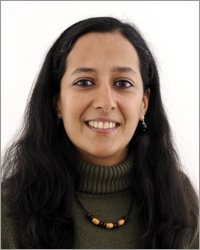 Guest Lecturer: Dr. Rachel Cleetus, Union of Concerned Scientists
Guest Lecturer: Dr. Rachel Cleetus, Union of Concerned Scientists
Rachel Cleetus is the policy director with the Climate and Energy program at the Union of Concerned Scientists. She leads the program’s efforts in designing effective and equitable policies to address climate change, and advocating for their implementation. Dr. Cleetus is an expert in policies to promote clean energy and drive deep cuts in heat-trapping emissions from the power sector, including carbon pricing and complementary sector-based policies. She also does research on the risks and costs of climate impacts and is an expert on policies to promote climate resilience. She has co-authored numerous reports and articles including the recent UCS reports Underwater: Rising Seas, Chronic Floods, and the Implications for US Coastal Real Estate; Surviving and Thriving in the Face of Rising Seas Building Resilience for Communities on the Front Lines of Climate Change; and The US Power Sector in a Net Zero World: Analyzing pathways for deep carbon reductions. She brings nearly twenty years of experience working on US climate and clean energy policies. She is also an expert on the United Nations Framework Convention on Climate Change (UNFCCC) process and has been attending international climate negotiations since 2009. Prior to joining UCS, she worked as a consultant for the World Wildlife Fund, conducting policy-focused research on the links between sustainable development, trade, and ecosystems in Asia and Africa. She also worked for Tellus Institute in the energy and environment program.
Thursday, September 16
Global Governance: The Idea and Reality
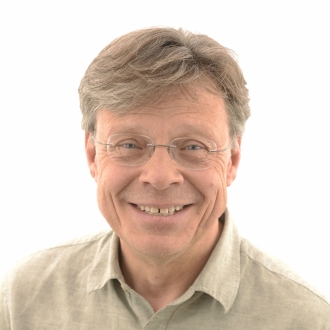 Guest Lecturer: Professor Craig Murphy, Wellesley College
Guest Lecturer: Professor Craig Murphy, Wellesley College
Craig N. Murphy is the Betty Freyhof Johnson ’44 Professor of Political Science at Wellesley College. He has been a researcher at the Radcliffe Institute of Advanced Study, the Center for Advanced Study in the Behavioral Sciences at Stanford, and the United Nations, where he directed a project that aimed to recover the history of the UN system’s work throughout the developing world. He is the co-author of America’s Quest for Supremacy and the Third World, and the author of International Organizations and Industrial Change: Global Governance since 1850 and UNDP: A Better Way? At Wellesley, he has been the co-director of the International Relations and the Peace and Justice Studies Programs, chair of Political Science, and acting chair of Africana Studies. He has also been president of the International Studies Association and the chair of the Academic Council on the UN System.
Tuesday, September 21
Global Environmental Governance
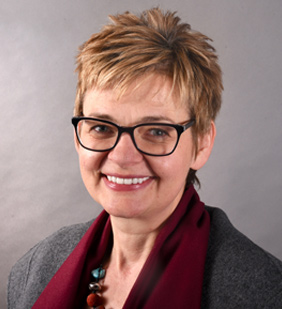 Guest Lecturer: Professor Maria Ivanova, University of Massachusetts, Boston
Guest Lecturer: Professor Maria Ivanova, University of Massachusetts, Boston
Maria Ivanova is an international relations and environmental policy scholar. She is Associate Professor of Global Governance and Director of the Center for Governance and Sustainability at the University of Massachusetts Boston and Director of the PhD and MA programs in global governance and human security. She is also a visiting scholar at the Center for Collective Intelligence at the Massachusetts Institute of Technology. Prof. Ivanova was appointed for a four-year term to the World Climate Research Program (WCRP) Joint Scientific Committee (JSC) in 2021. Ivanova’s work focuses on the performance of international institutions, implementation of international environmental agreements, and sustainability. She works closely with national governments, UN agencies, and convention secretariats in providing an academic perspective into their international environmental governance work. She has studied the United Nations Environment Programme and the international efforts on climate change. Currently, she studies national performance on global environmental conventions. Prof. Ivanova’s book, The Untold Story of the World's Leading Environmental Institution: UNEP at Fifty, was included in “12 new books with fresh approaches to act on climate change” by Yale Climate Communications in January 2021, in “7 must-read books” list on environment by the World Economic Forum in March 2021, and was #1 in new releases on environmental and natural resource law on Amazon for 1 week upon release in February 2021. In May, 2021, Prof. Ivanova launched the UNEP at 50 Dialogue Series, which commemorates UNEP’s 50th anniversary in conversation with prominent leaders. From 2014 to 2018, Ivanova served as a member of the Scientific Advisory Board of the UN Secretary-General, Ban Ki-moon. She is also an Andrew Carnegie Fellow and the Chair of the Board of the UN University Institute for the Advanced Study of Sustainability (UNU-IAS) and serves on the Yale Sustainability Advisory Council, and on the Carnegie Climate Governance Initiative (C2G2) Advisory Group.
Thursday, September 23
Climate Change Simulation
Lecturer: Heather Barry
Tuesday, September 28
First Exam
Thursday, September 30
Arms Control and Disarmament
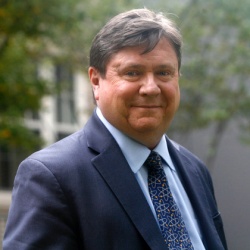 Guest Lecturer: Jim Walsh, U.S. Government
Guest Lecturer: Jim Walsh, U.S. Government
Jim Walsh is a Senior Research Associate at the Massachusetts Institute of Technology’s Security Studies Program (SSP). Walsh’s research and writings focus on international security, and in particular, topics involving nuclear weapons, the Middle East, and East Asia. Walsh has testified before the United States Senate and House of Representatives on issues of nuclear terrorism, Iran, and North Korea. He is one of a handful of Americans to travel to both Iran and North Korea for talks with officials about nuclear issues. His recent writings include,"The Implications of the JCPOA for Future Verification Arrangements (including the DPRK)," "The Digital Communications Revolution: Lessons for the Nuclear Policy Community," and “Laser Enrichment and Proliferation: Assessing Future Risks.” In 2021, Dr. Walsh and his team received a major grant from the Carnegie Corporation of New York for a project examining communication about nuclear weapons and international security on social media. He is the international security contributor to the NPR program “Here and Now,” and his comments and analysis have appeared in the New York Times, the New York Review of Books, Washington Post, Wall Street Journal, ABC, CBS, NBC, Fox, and numerous other national and international media outlets. Before coming to MIT, Walsh was Executive Director of the Managing the Atom project at Harvard University’s John F. Kennedy School of Government and a visiting scholar at the Center for Global Security Research at Lawrence Livermore National Laboratory. He has taught at both Harvard University and MIT. Dr. Walsh received his PhD from the Massachusetts Institute of Technology.
Tuesday, October 5
Preventing Terrorism and Violent Extremism
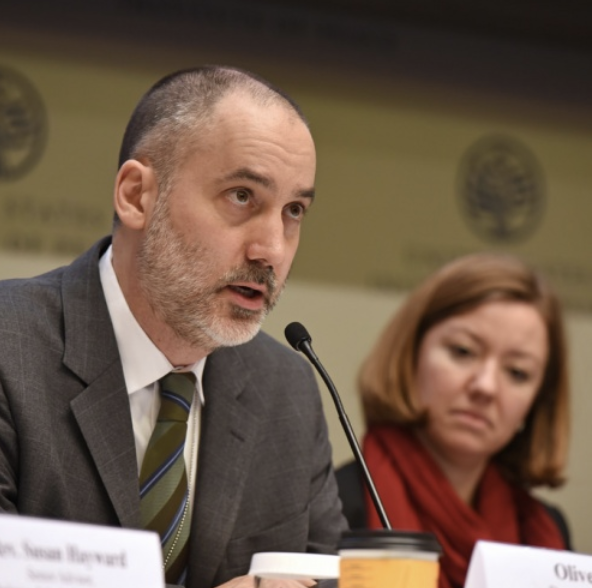 Guest Lecturer: Oliver Wilcox, U.S. Department of State
Guest Lecturer: Oliver Wilcox, U.S. Department of State
Oliver Wilcox (EPIIC91) is the Acting Director of Countering Violent Extremism at the Bureau of Counterterrorism within the United States Department of State. He has co-launched and co-directed the new office that develops and coordinates policies and multilateral initiatives to prevent and counter violent extremist radicalization and recruitment. He led a six-person team which designed and managed $50 million in pilot programming to prevent violent extremist radicalization and recruitment in countries of U.S. foreign policy importance. He has established and spearheaded new countering transnational white supremacist violent extremism and terrorist rehabilitation and reintegration teams. Prior to his time at the Department of State, he served a number of roles at USAID, including Senior Country Coordinator for Tunisia and Senior Peace and Security Advisor for the Middle East.
Thursday, October 7
The Global Governance of Violence
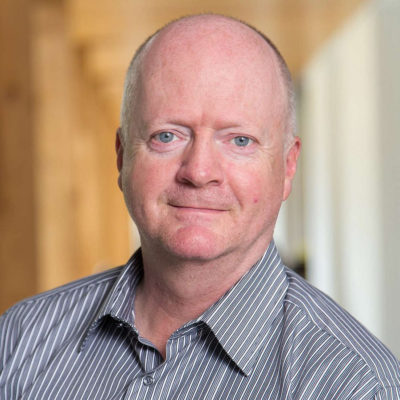 Guest Lecturer: Professor Alistair Edgar, Wilfrid Laurier University
Guest Lecturer: Professor Alistair Edgar, Wilfrid Laurier University
Dr. Alistair D. Edgar is Associate Professor of Political Science at Wilfrid Laurier University, with cross-appointment to the Balsillie School of International Affairs. He is an editor of Global Governance: A Review of Multilateralism and International Organizations (Brill/Nijhoff) and series co-editor for the ACUNS Series on the United Nations (Edward Elgar Publishers). He served as Executive Director of the Academic Council on the United Nations System (ACUNS) in 2003-2008 and 2010-2018. Outside of his scholarly activities, he is President of the Canadian Landmine Foundation. He is the author of “The Changing Role of the United Nations in Managing Armed Conflict” and “Pursuing Peace and Justice on the Security Council: The Canadian Experience”.
Tuesday, October 12
Global Development Governance
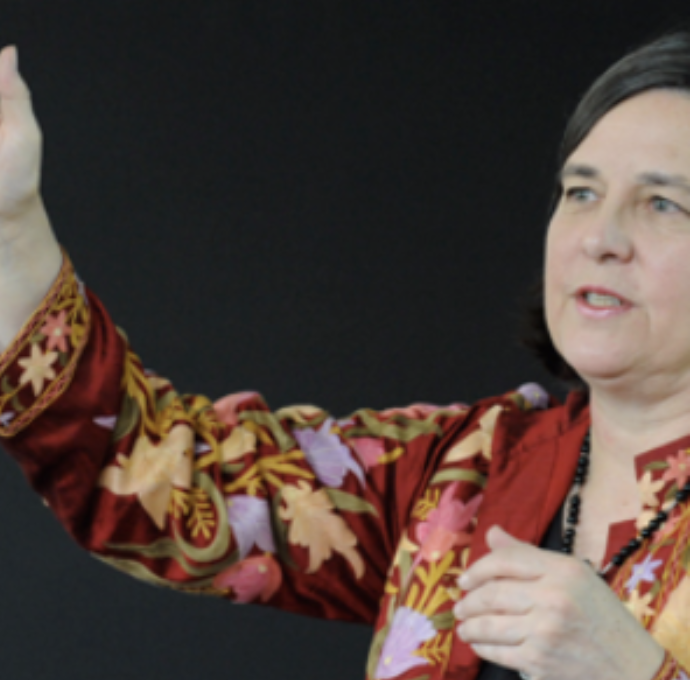 Guest Lecturer: Professor Katherine Marshall, Georgetown University
Guest Lecturer: Professor Katherine Marshall, Georgetown University
Katherine Marshall has worked for almost four decades on international development, with a focus on issues facing the world’s poorest countries. She is a senior fellow at Georgetown's Berkley Center for Religion, Peace and World Affairs and Professor of the Practice of Development, Conflict, and Religion in the School of Foreign Service. Her long career with the World Bank (1971-2006) involved a wide range of leadership assignments, many focused on Africa. From 2000-2006 her mandate covered ethics, values, and faith in development work, as counselor to the World Bank’s President. She was Country Director in the World Bank’s Africa region, first for the Sahel region, then Southern Africa. She then led the Bank's work on social policy and governance during the East Asia crisis years. She worked extensively on Eastern Africa and Latin America. As a long time manager, she was involved in many task forces and issues, among them exercises addressing leadership issues, conflict resolution, the role of women, and issues for values and ethics. Ms. Marshall has been closely engaged in the creation and development of the World Faiths Development Dialogue (WFDD) and is its Executive Director. She was part of the founding members of IDEA (International Development Ethics Association) and is part of the International Anti-Corruption Advisory Conference (IACC) advisory council. She served as a core group member of the Council of 100, an initiative of the World Economic Forum to advance understanding between the Islamic World and the West.
Thursday, October 14
Global Health Governance
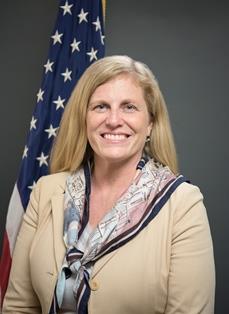 Guest Lecturer: Virginia Staab, State Department Fellow, The Fletcher School Tufts University
Guest Lecturer: Virginia Staab, State Department Fellow, The Fletcher School Tufts University
Virginia (Gini) Staab joined the Foreign Service in 2003 after a career as a legal marketing director for a San Francisco-based, international law firm. After the profoundly impacting events of September 11, 2001, Ms. Staab decided to dedicate herself to public service and she joined the Foreign Service. After joining the Department of State, Ms. Staab started her Foreign Service career in Bogota, Colombia as a non-immigrant visa officer with a stint as the Ambassador’s Staff Assistant. Subsequent postings include: Public Affairs Officer in Lisbon, Portugal, Press Spokesperson in Western Hemisphere Affairs in Washington, DC, and Fraud Prevention Manager and Immigrant Visa Chief in London, England. She also served temporary assignments in Haiti after the 2010 earthquake and as Consul General in Ponta Delgada, Azores during a three-month staffing gap. Ms. Staab served as Director of International Narcotics and Law Enforcement in Guatemala from 2014-2017, managing a $40 million annual budget and a team of 135 employees including officers, local staff, eligible family members, and third-party contractors. In Guatemala, she and her team developed capacity-building programs for Guatemala’s security and justice sectors and Indigenous communities. She also was the key reporting officer for the White House’s strategic initiative “Alianza para la Prosperidad del Triangulo Norte”. Most recently, she was the U.S. Consul General in Nogales, Mexico where she directed cross border economic, security, migration, education and cultural activities. She also led interagency relations in the Mexican state of Sonora, covering roughly 440 miles or one fifth of the entire U.S. Mexican border.
Tuesday, October 19
A Common Agenda: A UN Member State’s Perspective
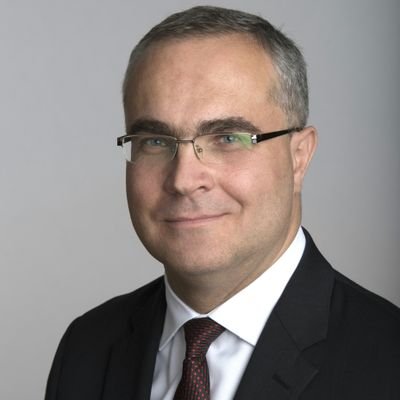 Guest Lecturer: Ambassador Michal Mlynár, Permanent Representative of Slovakia to the UN
Guest Lecturer: Ambassador Michal Mlynár, Permanent Representative of Slovakia to the UN
Michal Mlynár is the Permanent Representative to the United Nations on behalf of Slovakia and has been elected chair of the Sixth Committee (Legal). Prior to his appointment in 2017, Mr. Mlynár was his country’s Director General for International Organizations, Development Cooperation and Humanitarian Aid between 2015 and 2017. From 2012 to 2015, he was Ambassador to Kenya and to the United Nations agencies in Nairobi. Mr. Mlynár held several positions from 2010 until 2011, including Head of the Project Team for Security Sector Reform, Deputy Chef de Cabinet in the Office of the Minister, and Head of the Unit for Coordination of Candidatures and Cross Cutting United Nations activities. Between 2004 and 2009, Mr. Mlynár was Deputy Permanent Representative to the United Nations in New York, and his delegation’s political coordinator on the Security Council from 2006 to 2007. He was also Deputy Chef de Cabinet and Parliamentary Secretary to the Minister between 2002 and 2004.
Thursday, October 21
The Global Governance of Migration
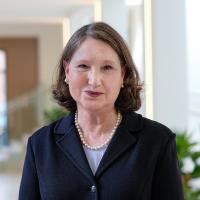 Guest Lecturer: Kathleen Newland, Migration Policy Institute
Guest Lecturer: Kathleen Newland, Migration Policy Institute
Kathleen Newland is a Senior Fellow and Co-Founder of the Migration Policy Institute. Her work focuses on the governance of international migration, the relationship between migration and development, and refugee protection. Prior to MPI’s establishment in July 2001, Ms. Newland co-directed the International Migration Policy Program at the Carnegie Endowment. Earlier, she was a Lecturer in international political economy at the London School of Economics (1988–92) and Special Assistant to the Rector of the United Nations University (1982–87). She has worked as a consultant to the International Labor Organization, the International Organization for Migration, the Office of the Secretary General of the United Nations, the UN Children’s Fund (UNICEF), the UN High Commissioner for Refugees (UNHCR), and the World Bank. Ms. Newland is a Member of the Board of Directors of Kids in Need of Defense (KIND), a nonprofit organization that provides pro bono legal services to unaccompanied children caught up in the U.S. immigration system. She has served on the Boards of Directors of the International Rescue Committee, the Stimson Center, USA for UNHCR, and the Foundation for the Hague Process on Migrants and Refugees. She is also a Chair Emerita of the Women’s Refugee Commission. Ms. Newland is author or editor of nine books, including most recently All at Sea: The Policy Challenges of Rescue, Interception, and Long-Term Response to Maritime Migration (MPI, 2016). She has also written more than 50 policy papers, articles, and book chapters.
Tuesday, October 26
Migration: States and Diasporas
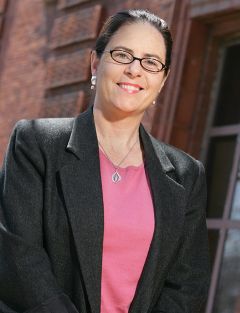 Guest Lecturer: Professor Katrina Burgess, The Fletcher School of Law and Diplomacy
Guest Lecturer: Professor Katrina Burgess, The Fletcher School of Law and Diplomacy
Katrina Burgess is Associate Professor of Political Economy at The Fletcher School of Law and Diplomacy at Tufts University. Previously, she taught at Syracuse (the Maxwell School), Brown, UCLA, and the Autonomous Technological Institute of Mexico (ITAM). She is author of Parties and Unions in the New Global Economy, which won the 2006 Outstanding Book Award for the best publication on labor issues granted by the Section on Labor Studies and Class Relations of the Latin American Studies Association, and co-editor with Abraham F. Lowenthal of The California-Mexico Connection. She has also published numerous book chapters, as well as articles in World Politics, Latin American Politics & Society, Studies in Comparative International Development, South European Politics and Society, Comparative Political Studies, Politica y Gobierno, and International Studies Review. Her current project addresses the impact of migration and remittances on the quality of democracy in developing countries. She has also served as Assistant Director of the U.S.-Mexico Project at the Overseas Development Council in Washington, D.C. and Associate Director of the California-Mexico Project at USC in Los Angeles.
Thursday, October 28
Food Security
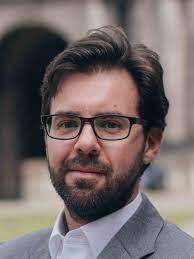 Guest Lecturer: Professor Matias Margulis, The University of British Columbia
Guest Lecturer: Professor Matias Margulis, The University of British Columbia
Matias Margulis is Assistant Professor in the School of Public Policy and Global Affairs and Faculty of Land and Food Systems at the University of British Columbia. His research and teaching interests are in global governance, development, human rights, international law and food policy. He has previously held academic positions at the University of Edinburgh, University of Stirling, University of Northern British Columbia and Max Plank Institute for the Study of Societies. In 2010-2011, he was the Cadieux-Léger Fellow at Global Affairs Canada. In addition to his academic research, Matias has extensive professional experience in the field of international policymaking and is a former Canadian representative to the World Trade Organization (WTO), Organization for Economic Cooperation and Development (OECD) and UN Food and Agriculture Organization (FAO). He has also advised the UN Special Rapporteur on the Right to Food and the Scottish Parliament and consulted for international NGOs and the Brookings Institution.
Tuesday, November 2
Human Rights
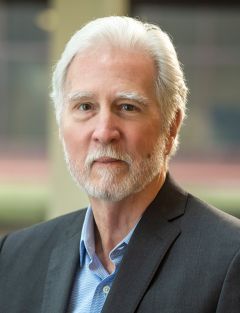 Guest Lecturer: Professor Hurst Hannum, The Fletcher School of Law and Diplomacy
Guest Lecturer: Professor Hurst Hannum, The Fletcher School of Law and Diplomacy
Hurst Hannum, Professor Emeritus of International Law at The Fletcher School of Law and Diplomacy at Tufts, has taught courses on international human rights law, minority rights, public international law, international organizations, and nationalism and ethnicity. His focus is on human rights and its role in the international legal and political order, including, in particular, issues of self-determination, minority rights, and conflict resolution. His scholarly work has been complemented by service as consultant/advisor to a number of intergovernmental and nongovernmental organizations, including the U.N. High Commissioner for Human Rights and Department of Political Affairs. He has been counsel in complaints before European, Inter-American, and U.N. human rights bodies. Professor Hannum was most recently a senior research at the Bonavero Institute of Human Rights, University of Oxford, and he also has taught at the University of Hong Kong, Central European University (Budapest), Harvard, American University, Georgia, and Virginia. Professor Hannum is the author or editor of numerous books and articles on international law and human rights, including "International Human Rights: Problems of Law, Policy, and Process," "Negotiating Self-Determination," "Guide to International Human Rights Practice," and "Autonomy, Sovereignty, and Self-Determination: The Accommodation of Conflicting Rights." His most recent book, "Rescuing Human Rights: A Radically Moderate Approach," will be published by Cambridge University Press in 2019. He serves on editorial advisory boards of Human Rights Law Review and Human Rights Quarterly.
Thursday, November 4
Second Exam
Tuesday, November 9
Race in International Relations
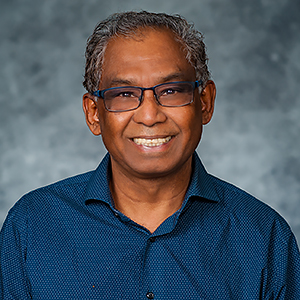 Guest Lecturer: Professor Randolph Persaud, School of International Service, American University
Guest Lecturer: Professor Randolph Persaud, School of International Service, American University
Randolph B. Persaud is Associate Professor of International Relations at American University in Washington D.C. He specializes in the areas of race and international relations, globalization, human security, and the politics of identity. Before joining American University, he was Assistant Director for the Center for International Security Studies at York University. At American University, he was Director of Comparative and Regional Studies. Dr. Persaud is the author of Counter-Hegemony and Foreign Policy published by the State University of New York Press and Co-Editor with Alina Sajed of Race, Gender, and Culture in International Relations: Postcolonial Perspectives. New York: Routledge (March 2018); Co-Editor of Race and International Relations, Special Issue of Alternatives (2001); Guest Editor of Race, Decoloniality and International Relations, Special Issue of Alternatives (2015) He has also published in major academic outlets such as Alternatives, Cambridge Review of International Affairs, Race and Class, Connecticut Journal of International Law, Latin American Politics and Society, Globalizations, Korea Review of International Studies, and Encyclopedia of Globalization.
Thursday, November 11
No Class, Veterans Day
Tuesday, November 16
Racism and World Politics
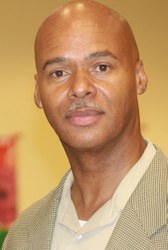 Guest Lecturer: Professor Errol Henderson, Pennsylvania State University
Guest Lecturer: Professor Errol Henderson, Pennsylvania State University
Errol A. Henderson is Associate Professor of International Relations (IR). He has authored 50 scholarly publications including five books—the latest on the black liberation struggle of the 1960s-70s, The Revolution Will not be Theorized (is available free online through the TOME Initiative: http://muse.jhu.edu/book/67098; and another on the role of religion in IR, Scriptures, Shrines, Scapegoats and World Politics , and free online as well: https://muse.jhu.edu/book/73721. He is presently working on two books: (1) on the role of white racism in IR; and (2) on gender and the Urban Peace and Justice Movement of the 1980s-90s in the US. Henderson established the Diasporas and Politics (DAP) project in 2019 to analyze the influence of racial and religious diasporas in world affairs. He is an original co-sponsor of the Liberation Film Series at the Charles H. Wright Museum of African American History in Detroit, MI. A member of a variety of professional, academic and activist organizations, Henderson is a veteran of the US Army. He also has been outspoken in challenging white supremacism in academia: Being Black at Penn State.
Thursday, November 18
The Dilemmas of Globalization
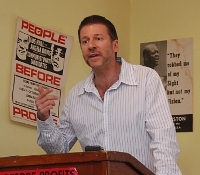 Guest Lecturer: Professor William I. Robinson, University of California, Santa Barbara
Guest Lecturer: Professor William I. Robinson, University of California, Santa Barbara
William I. Robinson is a professor of sociology at the University of California, Santa Barbara. He is also affiliated with the Latin American and Iberian Studies Program and with the Global and International Studies Program at UCSB. His scholarly research focuses on: macro and comparative sociology, globalization and transnationalism, political economy, political sociology, development and social change, immigration, Latin America and the Third World, and Latina/o studies. As a scholar-activist he attempts to link his academic work to struggles in the United States, in the Americas, and around the world for social justice, popular empowerment, participatory democracy, and people-centered development. He is the author of The Global Police State, Into the Tempest: Essays on the New Global Capitalism, and Global Capitalism and the Crisis of Humanity. He is the co-editor of We Will Not Be Silenced: Academic Repression of Israel’s Critics.
Tuesday, November 23
The Responsibility to Protect
Professor Abi Williams
Thursday, November 25
No Class, Thanksgiving
Tuesday, November 30
New Pandemics, Old Politics
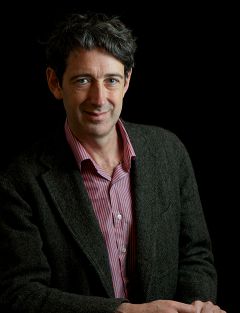 Guest Lecturer: Professor Alex de Waal, The Fletcher School of Law and Diplomacy
Guest Lecturer: Professor Alex de Waal, The Fletcher School of Law and Diplomacy
Alex de Waal is executive director of the World Peace Foundation and a research professor at The Fletcher School at Tufts University. Considered one of the foremost experts on Sudan and the Horn of Africa, his scholarship and practice has also probed humanitarian crisis and response, human rights, HIV/AIDS and governance in Africa, and conflict and peacebuilding. Professor de Waal received a D.Phil. from Oxford for his thesis on the 1984-1985 Darfur famine in Sudan. He worked for several Africa-focused human rights organizations, focusing on the Horn of Africa, and especially on avenues to peaceful resolution of the second Sudanese Civil War. He also researched the intersection of HIV/AIDS, poverty and governance, and initiated the Commission on HIV/AIDS and Governance in Africa. De Waal was a fellow at the Global Equity Initiative at Harvard (2004-2006), and program director at the Social Science Research Council. He was a member of the African Union mediation team for Darfur (2005-2006) and senior adviser to the African Union High-Level Implementation Panel for Sudan (2009-2012). He was on the list of Foreign Policy’s 100 most influential public intellectuals in 2008 and Atlantic Monthly’s 27 “brave thinkers” in 2009.
Thursday, December 2
Humanitarian Leadership and Complex Emergencies
 Guest Lecturer: Dr. Vincenzo Bollettino, Harvard University
Guest Lecturer: Dr. Vincenzo Bollettino, Harvard University
Dr. Bollettino is the Director of Resilient Communities Program at the Harvard Humanitarian Initiative. He also leads HHI’s engagement in the National NGO Program on Humanitarian Leadership. Prior to his current academic appointment, Dr. Bollettino served for five years as Executive Director of the Harvard Humanitarian Initiative. Dr. Bollettino has twenty-five years of professional and academic experience in disaster preparedness and resilience, civil-military engagement in emergencies, and humanitarian leadership. He has spent that past eighteen years of his career at Harvard University in research, teaching, and administration. His current research focuses on civil military engagement during humanitarian emergencies, disaster preparedness and resilience, the professionalization of the humanitarian aid field and humanitarian leadership. Dr. Bollettino has managed several large training and policy development initiatives related to disaster resilience, humanitarian leadership, and civil military coordination. He has designed security reporting systems and program evaluations for field security measures in complex emergencies, authored several publications related to disaster resilience and humanitarian assistance, and has consulted with numerous international nongovernmental organization and UN agencies. Dr. Bollettino has taught courses on research design, peace building, and international politics at the Harvard Extension School.
Tuesday, December 7
Drugs, Organized Crime and Money Laundering
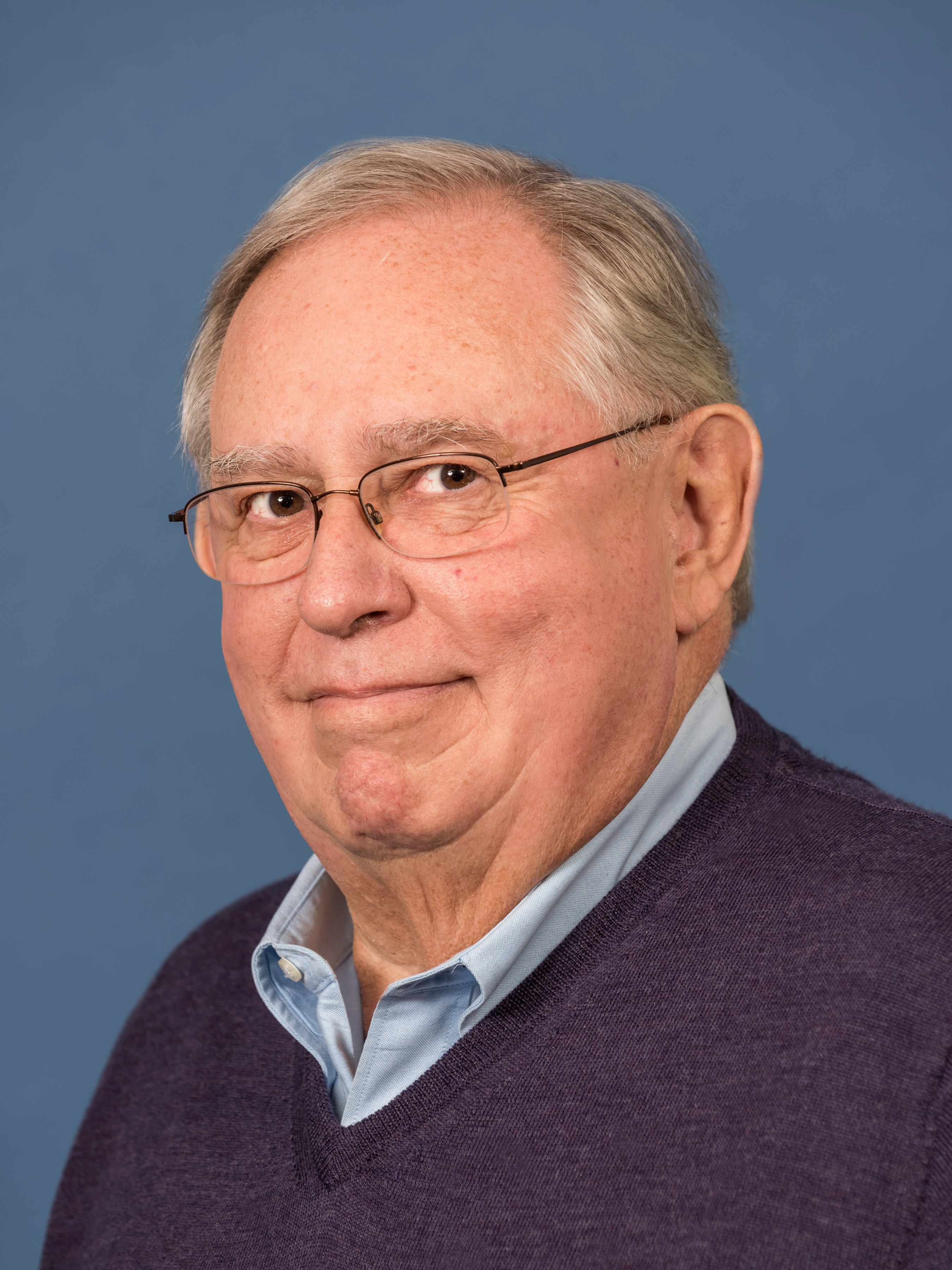 Guest Lecturer: Jack Blum, The Center for International Policy
Guest Lecturer: Jack Blum, The Center for International Policy
Jack Blum is a Washington lawyer who is an expert on white-collar financial crime, international tax evasion and one of this country’s premier advocates for victims of financial fraud. He spent fourteen years as a staff attorney with the Senate Antitrust Subcommittee and the Senate Foreign Relations Committee. He played a central role in the Lockheed Aircraft bribery investigation of the 1970's – which led to the passage of the Foreign Corrupt Practices Act – and in the investigation of the Bank of Credit and Commerce International (BCCI). Blum has been a consultant to the United Nations Centre on Transnational Corporations, the United Nations Office of Drug Control and Crime Prevention, and served as the chair of the experts group on international asset recovery, which was convened by the United Nations Centre for Drug Control and Crime Prevention. He often testifies about money laundering and tax evasion before U.S. congressional committees. Currently, Blum serves as ADA Counsel and is Chair of Tax Justice Network USA, and the Violence Policy Center.
Thursday, December 9
The Development Diplomat: Working Across Borders, Boardrooms, and Bureaucracies to End Poverty
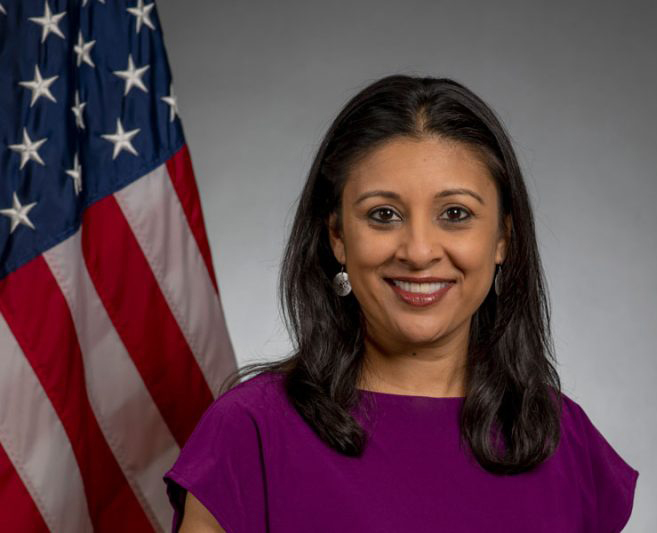 Guest Lecturer: Fatema Z. Sumar, Vice President, Department of Compact Operations
Guest Lecturer: Fatema Z. Sumar, Vice President, Department of Compact Operations
As Vice President of Compact Operations at the U.S. Millennium Challenge Corporation (MCC), Ms. Sumar oversees all compacts which are MCC’s signature grant investment vehicle to reduce poverty through economic growth. In this role, she manages all of MCC’s technical and regional divisions working on infrastructure, the environment and climate change, the private sector, gender and social inclusion, human and community development, land and agriculture, procurement, financial management, strategic partnerships, and contracts and grant management globally. She previously served as MCC’s Deputy Vice President for Europe, Asia, the Pacific, and Latin America where she managed all MCC compacts in these regions. Ms. Sumar returned to MCC after working in civil society as the Vice President of Global Programs at Oxfam America where she oversaw regional development and humanitarian response to fight the injustice of poverty. Her work contributed to initiatives on gender justice, climate justice, local humanitarian leadership, strategic monitoring and evaluation, digital rights, and grant management systems. Ms. Sumar has a distinguished career in the U.S. government in both executive and legislative branches. She previously served as the Deputy Assistant Secretary for South and Central Asia at the U.S. Department of State where she led U.S. efforts to expand regional economic and energy connectivity and as a Presidential Management Fellow (PMF). In Congress, she was a Senior Professional Staff Member on the U.S. Senate Foreign Relations Committee focused on Afghanistan, Pakistan, and the broader region. Ms. Sumar sits on Advisory Boards for Princeton, Cornell, and Indiana universities. Her work has been published in the Stanford Social Innovation Review, The New Republic, The Hill, and other outlets. She is a frequent guest speaker and has testified before the U.S. House of Representatives and U.S. Senate. Ms. Sumar graduated with a Master of Public Affairs from Princeton University’s School of Public and International Affairs, where she received the prestigious Stokes Award, and a Bachelor of Arts in Government from Cornell University. She studied abroad at the American University in Cairo.
Tuesday, December 14
Oceans and the need for sustainable fishing
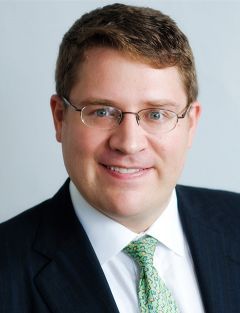 Guest Lecturer: Professor Rocky Weitz, Director of the Fletcher School Maritime Studies Program
Guest Lecturer: Professor Rocky Weitz, Director of the Fletcher School Maritime Studies Program
Rockford Weitz is professor of practice, entrepreneur coach, and director of the Maritime Studies Program at The Fletcher School of Tufts University. He also serves as president of the Institute for Global Maritime Studies Inc., a 501(c)(3) non-profit seeking practical solutions to global maritime challenges, and president & CEO at Rhumb Line International LLC, a consultancy providing strategic advice to entrepreneurs and startups. In 2014, Rockford served as founding executive director at FinTech Sandbox Inc. From 2008 to 2013, he served as founding CEO at CargoMetrics, leading the effort to build a VC-backed financial technology business that started in his Cambridge apartment. Prior to co-founding CargoMetrics, he was a senior fellow at the Institute for Global Maritime Studies, a team leader of Fletcher's Abu Dhabi Project, a fellow at Fletcher's Maritime Studies Program, and a fellow at Fletcher's Jebsen Center for Counter-Terrorism Studies. He has taught courses in jurisprudence, maritime security, and global maritime affairs at The Fletcher School, and published op-eds in The New York Times, The Christian Science Monitor, and The Straits Times (Singapore), among others. Before co-founding Rhumb Line in 2005, he served as international counsel at Schweitzer Engineering Laboratories Inc., leading the effort to open 12 international subsidiaries and streamline global operations. He also worked at the U.S. trade representative, and co-founded and served as program director of the Borgenicht Peace Initiative, a social entrepreneurship venture in Bethlehem.
Thursday, December 16
Final Exam
SPRING 2022
Thursday, January 20
First Day of Class
Lecturer: Professor Williams
Tuesday, January 25
Symposium Prep
Thursday, January 27
The Role of International Law
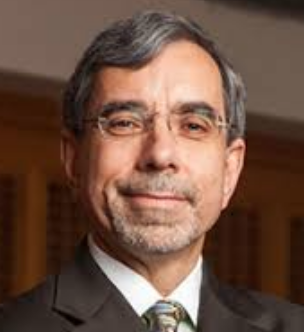 Guest Lecturer: Professor Anthony Clark Arend, Georgetown University
Guest Lecturer: Professor Anthony Clark Arend, Georgetown University
Anthony Clark Arend is Professor of Government and Foreign Service and Chair of the Department of Government . He served as Senior Associate Dean for Graduate and Faculty Affairs (later Vice Dean) in the Walsh School of Foreign Service from August 2015 until July 2018. He served as Director of the Master of Science in Foreign Service Program from 2008-2017. His research and teaching is in the fields of international law, national security law, international legal theory, and human rights. He has published seven books, including Legal Rules and International Society, International Law and the Use of Military Force (co-authored), and Human Dignity and the Future of Global Institutions (co-edited). With Professor Christopher C. Joyner, he founded the Institute for International Law & Politics at Georgetown and served as co-director of the Institute from 2003-2008. His is a University Affiliate at the Center for National Security and the Law at the Georgetown University Law Center and has also served as an adjunct professor of law. He serves as a Faculty Liaison to the Georgetown Institute for Politics and Public Service. He has served as Chair of the Main Campus Executive Faculty and Vice President of the Faculty Senate for the Main Campus. Prior to coming to Georgetown, he was a Senior Fellow at the Center for National Security Law at the University of Virginia School of Law. He has also served as an Articles Editor for the Virginia Journal of International Law. Dr. Arend is a Life Member of the Council on Foreign Relations and serves as a Senator on the Board of Governors of the Georgetown University Alumni Association. In April 2017, Arend received the John Carroll Award from the Georgetown University Alumni Association. This award ‘’is conferred upon Georgetown alumni whose achievements and record of service exemplify the ideals and traditions of Georgetown and its founder’’ and is the highest honor given by the Alumni Association. Dr. Arend received a Ph.D. and an M.A. in Foreign Affairs from the Department of Government and Foreign Affairs of the University of Virginia. He received a B.S.F.S., magna cum laude, from the Edmund A. Walsh School of Foreign Service at Georgetown University.
Tuesday, February 1
The Role of Diplomacy
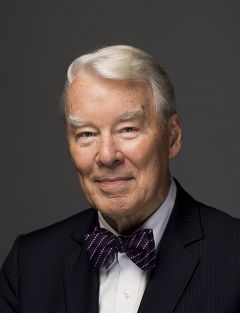 Guest Lecturer: Professor Alan Henrikson, The Fletcher School of Law and Diplomacy
Guest Lecturer: Professor Alan Henrikson, The Fletcher School of Law and Diplomacy
Alan K. Henrikson is the Lee E. Dirks Professor of Diplomatic History Emeritus and founding Director of Diplomatic Studies at The Fletcher School at Tufts University where he taught American diplomatic history, contemporary U.S.-European relations, global political geography, and the history, theory, and practice of diplomacy. During the academic year 2010-2011 he was Fulbright Schuman Professor of U.S.-EU Relations at the College of Europe in Bruges. In November 2014, March 2015, and April 2017 he taught in Tallinn at the Estonian School of Diplomacy, and in April 2018 in Moscow at MGIMO University. In the autumn of 2016 he lectured at the Australian National University in Canberra and for the National University of Vietnam in Ho Chi Minh City and at the Diplomatic Academy of Vietnam in Hanoi. In August 2009 he was Guest Lecturer in diplomatic studies, discussing also U.S. relations with countries in the southern African region, at the University of Pretoria. In November 2005 he was Visiting Professor at the European Commission in Brussels where he taught a course on American Foreign Policy Making for Commission officials. During the Spring of 2003 he was Fulbright/Diplomatic Academy Visiting Professor of International Relations at the Diplomatische Akademie in Vienna. He has been an Associate and a Visiting Scholar at the Weatherhead Center for International Affairs at Harvard University, where he also has served as Counselor on Canadian Affairs. During 1986-1987 he was Lloyd I. Miller Visiting Professor of Diplomatic History and Scholar-in-Residence at the Center for the Study of Foreign Affairs in the Foreign Service Institute of the United States Department of State. He also has taught as Visiting Professor at the National Institute of Defense Studies in Tokyo and as United Nations Development Programme (UNDP) Visiting Professor of Diplomatic History at the China Foreign Affairs University in Beijing.
Thursday, February 3
Symposium Prep
Tuesday, February 8
The Role of Regional Organizations
Lecturer: Professor Williams
Thursday, February 10
The Role of the UN Secretary-General
Lecturer: Professor Williams
Tuesday, February 15
Symposium Prep
Thursday, February 17
The Role of the UN Security Council
Lecturer: Professor Williams
Tuesday, February 22
The Role of Non-state Actors
Lecturer: Professor Williams
Thursday, February 24
No Classes, Monday’s Schedule
Tuesday, March 1
The Use of International Criminal Law in Response to Atrocity: A Regime in Crisis?
 Guest Lecturer: Professor Tom Dannenbaum, The Fletcher School of Law and Diplomacy
Guest Lecturer: Professor Tom Dannenbaum, The Fletcher School of Law and Diplomacy
Tom Dannenbaum is assistant professor of international law. Prior to joining Fletcher in 2017, he was lecturer in human rights at University College London and visiting lecturer in law and Robina Foundation visiting human rights fellow at Yale Law School. Tom writes on international law, focusing primarily on the laws of war, the law on the use of force, international criminal law, shared responsibility, and international judging. He has also written on peace negotiations, terrorist strategy, reparations, and the philosophical basis for punishing atrocity crimes perpetrated via the state. His work has been published in a range of leading journals, including the Yale Law Journal, the European Journal of International Law, International & Comparative Law Quarterly, International Law Studies, the Harvard International Law Journal, and Security Studies. His book, The Crime of Aggression, Humanity, and the Soldier, was published by Cambridge University Press in 2018. His article, "Why Have We Criminalized Aggressive War?", was awarded the Lieber Prize by the American Society of International Law in 2017. His work on accountability for peacekeeper abuses has been cited by the International Law Commission and the Hague Court of Appeals in the Netherlands.
Thursday, March 3
Why We Need an International Civilian Protection Service
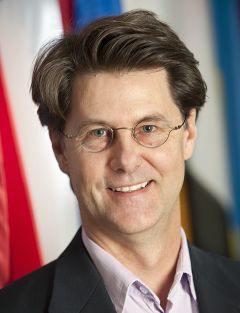 Guest Lecturer: Professor Ian Johnstone, The Fletcher School of Law and Diplomacy
Guest Lecturer: Professor Ian Johnstone, The Fletcher School of Law and Diplomacy
Ian Johnstone is a Professor of International Law at The Fletcher School at Tufts University. From 2018 -2019 he served as Dean ad interim. From 2013 to 2015, he was the Academic Dean. Prior to joining Fletcher in 2000, Johnstone served in the United Nations’ Executive Office of the Secretary-General and Department of Peacekeeping Operations. He continues to work as an occasional consultant to the United Nations. His most recent books include “Legal Argumentation Beyond Courts” (Co-editor, Oxford University Press, forthcoming 2021); “The Oxford Handbook on International Organizations" (Co-editor, Oxford University Press, 2016); "Law and Practice of the United Nations, 2nd edition" (co-author, Oxford University Press, 2016); and "The Power of Deliberation: International Law, Politics and Organizations" (Oxford University Press, 2011). Selected articles and book chapters include “Louis Sohn’s Legacy”, European Journal of International Law (2020); “The evolution of the United Nations Charter” in Simon Chesterman et al eds., "The Oxford Handbook of U.N. Treaties" (Oxford University Press, 2018); “The U.N. Security Council and International Law” in Sebastian von Einsiedel et al eds., "The United Nations Security Council in the 21st Century" (2016); "When the Security Council is Divided: Imprecise Authorizations, Implied Mandates and the Unreasonable Veto” in Marc Weller ed, "Oxford Handbook of the Use of Force" (2015); “Law-making by International Organizations: Perspectives from International Law/International Relations Theory”, in Jeff Dunoff and Mark Pollack eds. "Interdisciplinary Perspectives on International Law and International Relations: The State of the Art" (2013); and “Legislation and Adjudication in the U.N. Security Council: Bringing Down the Deliberative Deficit,” American Journal of International Law (2008). While on sabbatical in 2020, he was a Visiting Professor jointly at the University of Toronto Faculty of Law and Munk School of Global Affairs and Public Policy. From 2005-2007, he was the lead author and founding editor of the Annual Review of Global Peace Operations. He is currently on the editorial boards of Global Governance Journal and International Organizations Law Review. He is also a Non-Resident Senior Fellow at the Center on International Cooperation, New York University and a Member of the International Advisory Board of the International Peace Institute. Johnstone, recipient of the James L. Paddock Teaching Award in 2005, teaches courses in international organizations, peace operations and nuclear non-proliferation. A citizen of Canada, he holds an LL.M degree from Columbia University and JD and B.A. degrees from the University of Toronto.
Tuesday, March 8
Inquiry Prep
Thursday, March 10
Symposium Prep
Tuesday, March 15
Inquiry Prep
Wednesday, March 16, 5:30-6:30
Inquiry Prep with Education Department Eaton 201
Thursday, March 17
Symposium Prep
Tuesday, March 22
Spring Break
Thursday, March 24
Spring Break
Tuesday, March 29
TILIP
March 31 - April 2
EPIIC Symposium
Tuesday, April 5
Inquiry Prep
April 7 - 9
Inquiry
Tuesday, April 12
Symposium and Inquiry Reviews
Thursday, April 14
Cybersecurity
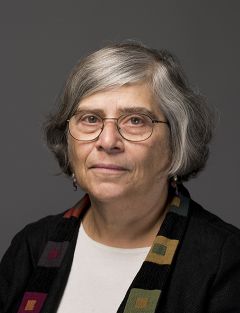 Guest Lecturer: Professor Susan Landau, The Fletcher School of Law and Diplomacy
Guest Lecturer: Professor Susan Landau, The Fletcher School of Law and Diplomacy
Susan Landau is bridge professor in cyber security and policy, and splits her time between Fletcher and Tufts University's School of Engineering (as a professor of Computer Science). Susan works at the intersection of cybersecurity, national security, law, and policy. She has testified before Congress, written for the Washington Post, Science, and Scientific American, and frequently appears on NPR and BBC. Her previous positions include senior staff privacy analyst at Google, distinguished engineer at Sun Microsystems, and faculty member at Worcester Polytechnic Institute, the University of Massachusetts Amherst, and Wesleyan University.
Tuesday, April 19
Africa and Problems Without Passports
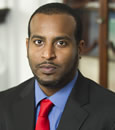 Guest Lecturer: Professor Michael Woldemariam, Boston University
Guest Lecturer: Professor Michael Woldemariam, Boston University
Michael Woldemariam is an associate professor of International Relations at Boston University’s Pardee School of Global Studies. He also serves on BU’s graduate faculty of Political Science and is a faculty affiliate at the African Studies Center. He previously worked as a research specialist with Princeton University’s Innovations for Successful Societies program, and held fellowships at the Woodrow Wilson International Center in Washington, DC and Penn State’s Africana Research Center. Woldemariam’s teaching and research interests are in African security studies, with a particular focus on armed conflict in the Horn of Africa. Woldemariam’s scholarly work has been published in the journals Nationalism and Ethnic Politics, Terrorism and Political Violence, Journal of Strategic Studies, and the Journal of Eastern African Studies. His popular essays have appeared in outlets such as Foreign Affairs, Foreign Policy, and Current History. His first book, Insurgent Fragmentation in the Horn of Africa: Rebellion and Its Discontents, was published with Cambridge University Press in 2018. In addition to his scholarly work, Woldemariam has consulted with a wide variety of international organizations, primarily on issues related to politics, governance, and security in the Greater Horn of Africa region. Professor Woldemariam’s areas of expertise include comparative politics, international security, African politics, Horn of Africa, political violence and conflict, post-conflict governance and institution building, and identity politics.
Thursday, April 21
Presentations on Research Papers: Ellie, Bri, Margo, Cole, Ria
Tuesday, April 26
Presentations on Research Papers: Hunter, Ian, Sage, Izzy, Melanie
Thursday, April 28
Presentations on Research Papers: Joseph, Meera, Isabella, Maya
Tuesday, May 3
Presentations on Research Papers: Selomi, Janya, Seif, Rachel
Monday, May 9
Research Papers Due
